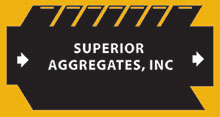
Is a Concrete Driveway the Best Choice for Your Home?
Has your driveway seen better days? Cracks, potholes, and drainage issues are all tell-tale signs that a new driveway install may be in your immediate future.
If you’re ready to replace your driveway, you have many options, including having a concrete driveway or a cement driveway installed. Keep reading to learn about the pros and cons of installing a concrete vs. a cement driveway.
The Differences Between Concrete and Cement Driveways
Concrete and cement are often used interchangeably because they look similar; however, they are not the same. Very few things are constructed with cement alone.
Cement is an ingredient in concrete. Along with cement, concrete is also manufactured with water and aggregates including gravel, stone, and sand, which make up about 75% of concrete. Cement, meanwhile, is made from a mixture of silicon, calcium, iron, and aluminum, which are then heated up to a very high temperature before being ground into a fine powder we know as cement. It is then often used as a component of concrete.
Using cement alone is more suitable for smaller projects such as grout or to repair damaged concrete. Most experts don’t recommend using just cement to construct a driveway because it is less durable than concrete and won’t last as long.
Using Concrete to Construct a Driveway
Concrete is one of the most popular and durable materials in the world. It’s used to construct homes, commercial buildings, driveways, columns, and foundations.
Some of the benefits of choosing a concrete driveway over cement, asphalt, or gravel include:
Durable and Long Lasting
Well-maintained concrete driveways can last 30 years or more. Ensure you hire a reputable concrete company to install your driveway as proper installation plays an important role in the durability and lifespan of your driveway. Typically constructed with separate square slabs, concrete driveways are durable enough to handle heavy trucks, RVs, and boats. Concrete driveways often last 50% or longer than asphalt surfaces.
Low Maintenance
Concrete driveways are incredibly easy to maintain. They typically require only regular sweepings or power washes. A concrete sealer should be applied once a year, especially in colder climates that experience frequent freeze-thaw cycles.
Cost-effective
Although concrete driveways are more expensive to construct than other surfaces, they’re most cost-effective in the long run because of reduced maintenance costs, fewer repairs, and a longer life expectancy.
Increased Home Value
Concrete driveways can help increase your home’s value. Not only do many people think concrete is more aesthetically pleasing than other surfaces, but potential homebuyers may be more likely to buy your house knowing the surface requires little maintenance and can last for 30 or more years before a replacement driveway is needed.
Environmentally Friendly
Concrete is a recyclable material, which makes it environmentally friendly. It also requires reduced energy than other materials because it doesn’t need to be repaired, resurfaced, and it lasts longer.
The Cons of Installing a Concrete Driveway
Overall, there are very few cons to installing a concrete driveway. If you’re looking for a cheaper alternative to a concrete driveway due to budgetary constraints, then it may be more cost-effective in the short term to install an asphalt driveway.
Although concrete requires minimal maintenance, it does need to be sealed once a year to ensure the durability of the surface. Fluids or oil stains from cars can be very difficult to remove once they seep into the surface.
